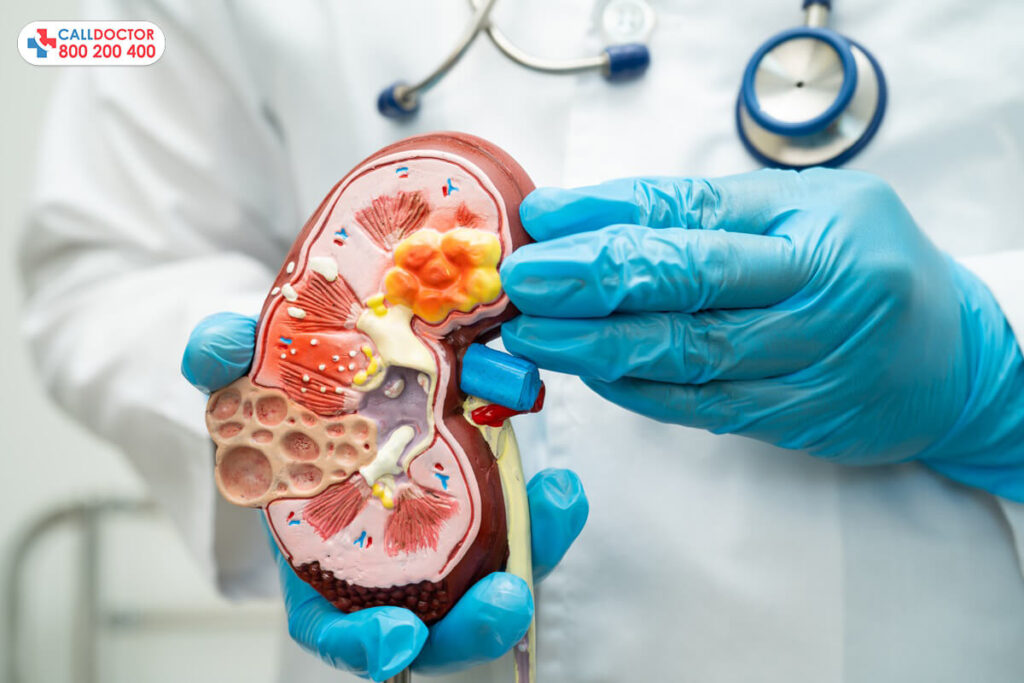Did you know that chronic kidney disease (CKD) impacts about 10% of people worldwide, and its prevalence is growing in the UAE due to higher rates of diabetes and hypertension? This underscores the urgent need for increased awareness and proactive kidney health care. Our kidneys are remarkable organs that filter toxins from the blood, regulate blood pressure, maintain fluid balance, and produce essential hormones. Despite their crucial role, kidney health often only gets the attention it deserves once severe issues emerge.
Understanding the Role of Kidneys
The kidneys are two bean-shaped organs located directly below your rib cage, on either side of your spine. Each kidney is made up of a fist’s worth of tissue. Urine is the byproduct of their primary job: filtering waste materials or extra fluid from the blood. The kidneys also create hormones that govern blood pressure and red blood cell formation, maintain acid-base balance, and regulate electrolytes.
Common Kidney Diseases
The most common diseases related to kidneys are chronic kidney disease (CKD) or acute kidney injury (AKI), kidney stones, and infections like pyelonephritis. CKD is particularly insidious because it progresses slowly and often without symptoms until the kidneys are severely damaged. Knowing these conditions’ risk factors and signs is crucial to seek timely medical intervention.
Risk Factors for Kidney Disease
Numerous variables raise the risk of renal illness, such as high blood pressure, diabetes, heart disease, obesity, and a family history of renal problems. Smoking, binge drinking, and a diet high in sugar and salt are a few examples of lifestyle choices that may be problematic. It’s critical to manage these risk factors by maintaining a healthy lifestyle and making regular doctor’s appointments.
Acknowledging the Indications of kidney diseases
It’s common to refer to kidney illness as a “silent disease” since symptoms can not show up until serious harm has been done. Nonetheless, there are a few warning indicators, such as exhaustion, difficulty focusing, low appetite, difficulty sleeping, cramping in the muscles, swollen ankles and feet, puffiness around the eyes, itchy or dry skin, frequent urination (particularly at night), and blood in the urine.

The Importance of Lab Tests
Lab tests are crucial for diagnosing and monitoring kidney health. Common tests include blood tests to measure creatinine and blood urea nitrogen (BUN) levels, urine tests to check for protein or blood, and imaging tests like ultrasound or CT scans to visualize the kidneys. A glomerular filtration rate (GFR) test is critical as it measures how well your kidneys filter blood.
Doctor Consultation: What to Expect?
When visiting a doctor for kidney health, be prepared to provide a comprehensive medical history and undergo a physical examination. Your doctor may ask about symptoms, lifestyle habits, and family history. Based on the initial assessment, they may recommend specific lab tests or refer you to a nephrologist, a specialist in kidney care. Following your doctor’s advice and attending all follow-up appointments is essential.
Preventive Measures
Preventing kidney disease through a healthy lifestyle with a balanced diet filled with nutrients, fruits, vegetables, and whole grains, staying well-hydrated, exercising regularly, and avoiding tobacco and excessive alcohol. It’s also crucial to monitor and control blood sugar and blood pressure. Regular health check-ups are essential for detecting early signs of kidney issues.
Treatment Options for Kidney Diseases
The treatment for disease related to the kidney varies depending on the underlying cause and stage. Early-stage chronic kidney disease (CKD) can often be managed with lifestyle modifications and medications to regulate blood pressure and blood sugar levels.
The Role of Diet and Hydration
A kidney-friendly diet is low in sodium, phosphorus, and protein. Staying hydrated is also vital, but the amount of fluid intake may need to be adjusted based on the stage of kidney disease. It’s best to consult a dietitian who can provide personalized dietary recommendations.

FAQs About Kidney Health
Q: How often should I get my kidneys checked?
A: If you have risk factors for kidney disease, it’s advisable to have annual check-ups. Otherwise, discuss with your doctor to determine a suitable schedule.
Q: Can kidney disease be reversed?
A: Early stages of kidney disease can often be managed, and progression can be slowed with proper treatment. However, damage from advanced kidney disease is usually irreversible.
Q: What should I do if I have a family history of kidney disease?
A: If you have a family history of kidney disease, getting regular check-ups and screenings is essential to detect any early signs.
Q: Are there medications that can harm my kidneys?
A: Some medications, including over-the-counter pain relievers and certain antibiotics, can harm the kidneys if misused. Always talk to your doctor before starting any new medication.
How can Call Doctor help?
Call Doctor offers comprehensive services, including expert consultations, advanced lab diagnostic testing, and personalized treatment plans. Our team of experienced physicians helps you maintain optimal kidney function and manage any kidney-related conditions effectively.
By understanding the risk factors, recognizing symptoms, undergoing regular screenings, and following medical advice, you can significantly reduce the risk of kidney disease. For expert guidance and personalized care, consider partnering with Call Doctor. Your kidneys will thank you!




